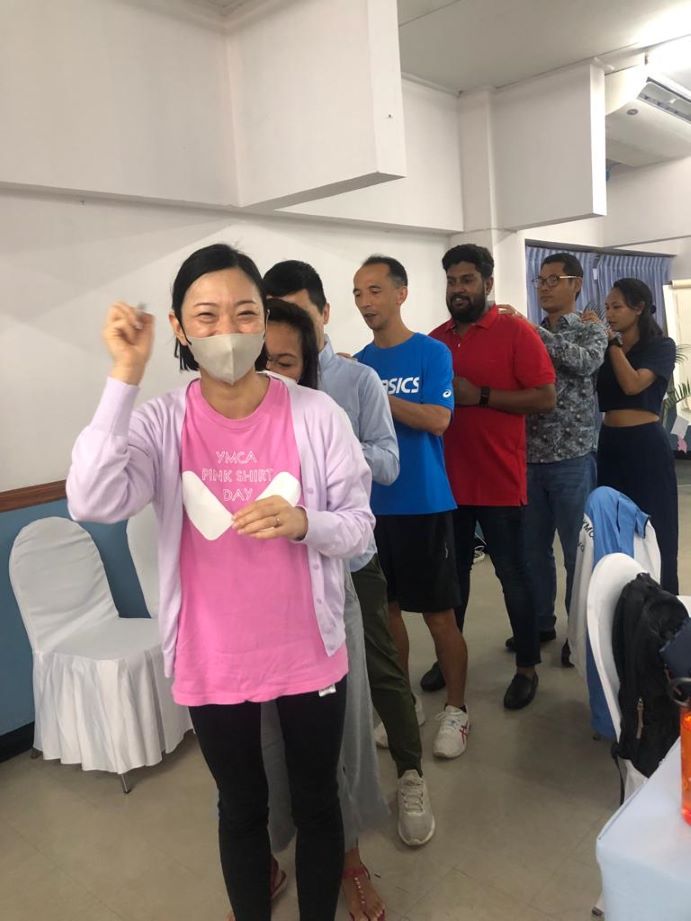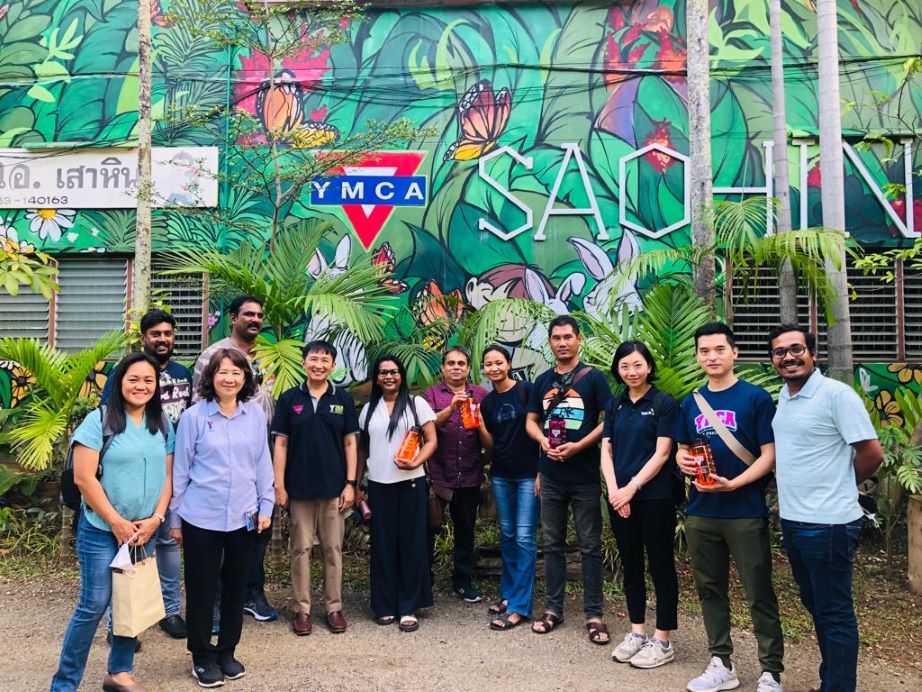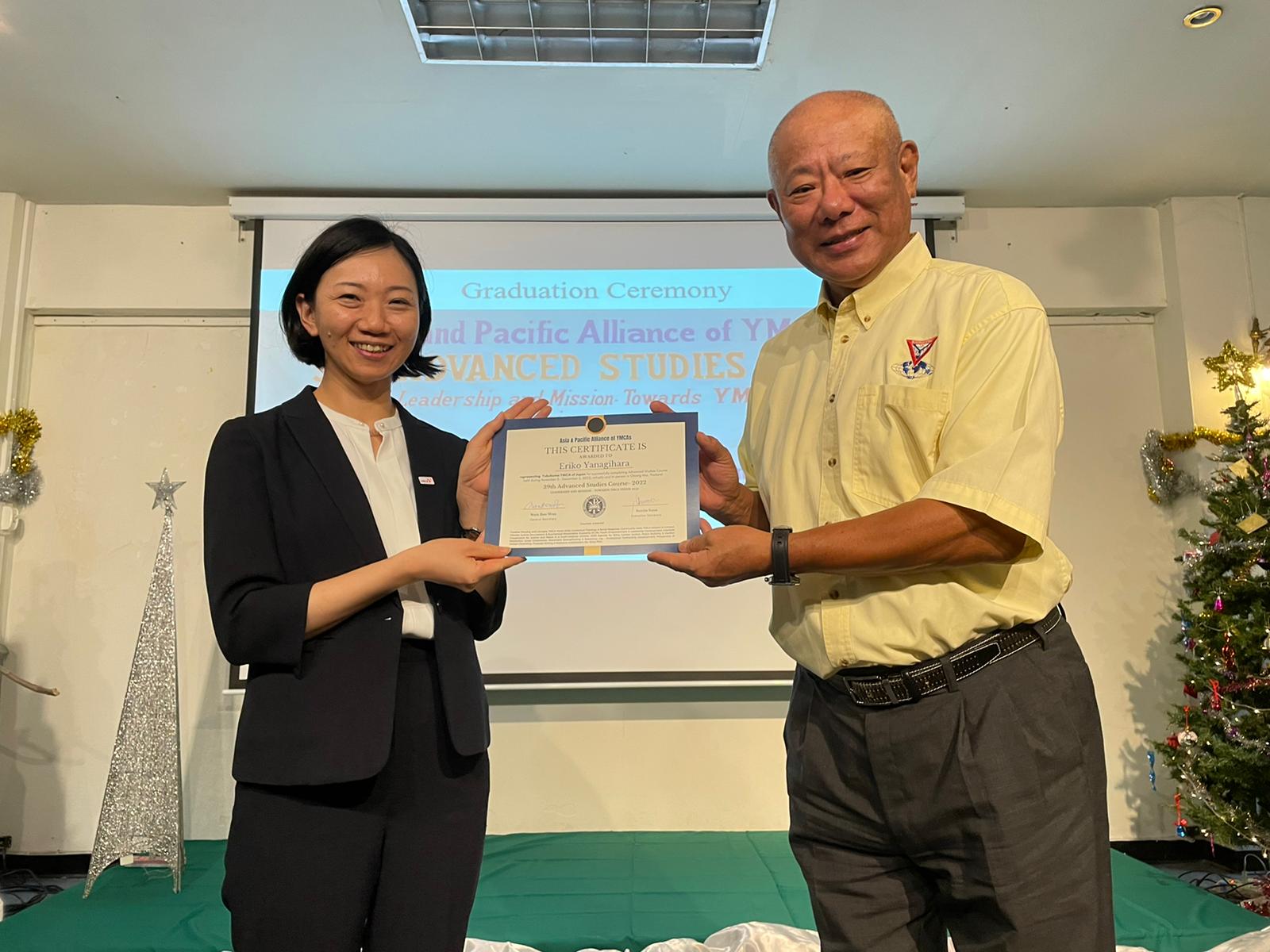My Learnings at the 39th Advanced Studies Course by Eriko Yanagihara
Last Updated (Wednesday, 31 May 2023 10:48)
Motivations and Expectations for Participating in the ASC
 My motivation for participating in Advanced Study Course was that, as a staff of global and local community services, I wanted to promote the various activities of the Yokohama YMCA's projects in order to collaborate with the YMCA movement in the world, especially in the Asia-Pacific region, and to enhance the qualities (knowledge, skills, experience, and network) of the YMCA staff needed for this purpose.
My motivation for participating in Advanced Study Course was that, as a staff of global and local community services, I wanted to promote the various activities of the Yokohama YMCA's projects in order to collaborate with the YMCA movement in the world, especially in the Asia-Pacific region, and to enhance the qualities (knowledge, skills, experience, and network) of the YMCA staff needed for this purpose.
I also hoped to learn more about the social issues that arise due to the diversity and vulnerability of the Asia-Pacific region and to learn from the opinions of other participants on how YMCA can face and tackle these social issues.
A deeper understanding of our mission and Vision 2030 is essential for this. Through the ASC, I hoped to broaden my perspective and gain leadership skills to accept diverse values and advance the YMCA movement from new perspectives.
Building community
For the first, we started to know each other by sharing “Life Journeys.” It was a step forward in learning more about the people we will study with. It helped us to experience firsthand the diversity of each participant's background, relationship with the YMCA, and faith. It was also an excellent experience for the participants to take on roles such as daily worship, moderator, and documentation to manage the training schedule.
Since the YMCA is an ecumenical movement with diverse denominations of Christianity and non-Christians, we learned how to create worship that transcends differences in faith, brings us together, and unites our hearts through worship. I was used to the pattern of worship at the church I usually attend, but I learned that there is more than one way to create worship and that because the YMCA is an ecumenical organization, it is possible to develop worship in many different ways.
As the training progressed, through the lectures and discussions with participants from different countries, I gained a realistic sense of the diversity of the Asia-Pacific region. Despite the diversity and differences, all YMCAs share common challenges, and this was an opportunity to learn how to develop the YMCA movement in the diverse contexts of Asia.

Contemporary Christian theological perspective & YMCA Mission
Learning about the mission initially was very important for the rest of the training because everything involved in the YMCA movement is based on the mission.
Mr. Nam boo won, General Secretary of APAY, pointed out that we should not try to understand the YMCA mission as it is but need to read it in each of our contexts, in the diversity of our contexts.
We also learned that the YMCA is not an issue-oriented organization that takes a holistic approach to society and people.
To strengthen our YMCA movement, it needs to be biblically faith-based and socially relevant.
We can learn our mission from the history of the YMCA, through Paris Basis, the Kampala Principles, and Challenge 21, and by understanding our context from a cultural, historical, political, and economic perspective about our region.
VISION 2030 and contemporary social realities & Alternative Responses
There were lectures such as; Gender Justice, Climate change, Interfaith Dialogue and Cooperation, and Peace Building & Conflict Resolution.
Each lecture was specific and practical and provided an opportunity to think about how to face these social issues in my community. It was an excellent opportunity to hear from experts working in the field, which led to a deeper understanding.
Although there are differences in the issues in each country and region, we were able to think together about how YMCA can respond to these issues in the context of a global problem.
Youth Leadership and Empowerment
It was important and meaningful to discuss the YMCA as a movement and the involvement of youth, along with learning about social issues. This is a topic of great interest to me because of my experience of being empowered by the YMCA from my youth days until now.
We reaffirmed that the YMCA is a youth-focused organization and that its role is to impact society to create a better society, still for youth, by youth, and with youth. We must constantly ask ourselves whether the familiar words "empowerment" and "youth leadership" have become one-sided impositions.
Movement strengthening
It was a good opportunity to look at my own YMCA from the perspective of organizational management. I learned about strategic planning with a long-term view, relationship building with lay leaders, and the good governance needed to put the YMCA mission into practice. In discussions with other participants, issues such as weak governance and little participation by lay leaders were raised, providing an opportunity to learn the reality of the difficulties in strengthening the organization.
Contextual programme response, Evaluation & Graduation
Through our studies at the ASC, we developed a re-entry plan that we will implement upon our return to our own YMCA. I had been trying to figure out the community's social issue that the YMCA should address. Throughout this process, I found all the learnings of the ASC very useful, and I realized that I had changed my mindset more than ever as a promoter of the YMCA movement. Creating the re-entry plan was very difficult, but seeing all the other participants taking it seriously and advising each other was encouraging. When each student's presentation was completed, critiqued, and awarded a certificate of completion, I felt a sense of accomplishment but also a sense of sadness that the ASC had come to an end. It means that we could spend such an intense and fulfilling training period.
It is very reassuring to think that even after the ASC is over, my friends who studied with me for a month still work hard with YMCA spirit in their respective countries.

For the future
I learned the importance of never being satisfied with the status quo and always continuing to change for the better.
Remembering the lesson that the YMCA is an organization by youth and for youth and that the YMCA mission should be practised in a way that is in line with the region and the times, I would like to promote the YMCA movement in Japan and Yokohama.
I want to contribute to the YMCA's strength (strengthening the YMCA organization) by communicating how YMCA projects and activities rooted in the local community are connected to global social issues.
I will promote the YMCA movement in the global and local community services of the Yokohama YMCA, using the network established at ASC.
I will make it more important than ever to communicate the mission of the YMCA so that we can work in the same direction to promote Vision 2030 globally, in the Asia-Pacific region, in Japan, and Yokohama.
With gratitude
Finally, I would like to express my gratitude to the Yokohama YMCA and the National Council of YMCAs of Japan for sending me to participate in the ASC, to the laypersons and colleagues for their encouragement, and to my family for their support and endurance during the half month without their mother.
Also, a lot of appreciation to the APAY staff for preparing and arranging all the training and taking good care in its execution, as well as all those who provided sufficient knowledge and experience as resource persons.
I want to thank my fellow participants in the training with me for their patience, listening and trying to understand me despite my English communication difficulties. I thank God for allowing me to have such wonderful encounters and experiences.
By Eriko Yanagihara
Global & Local Community Services
Yokohama YMCA,
Participant of the 39th ASC
